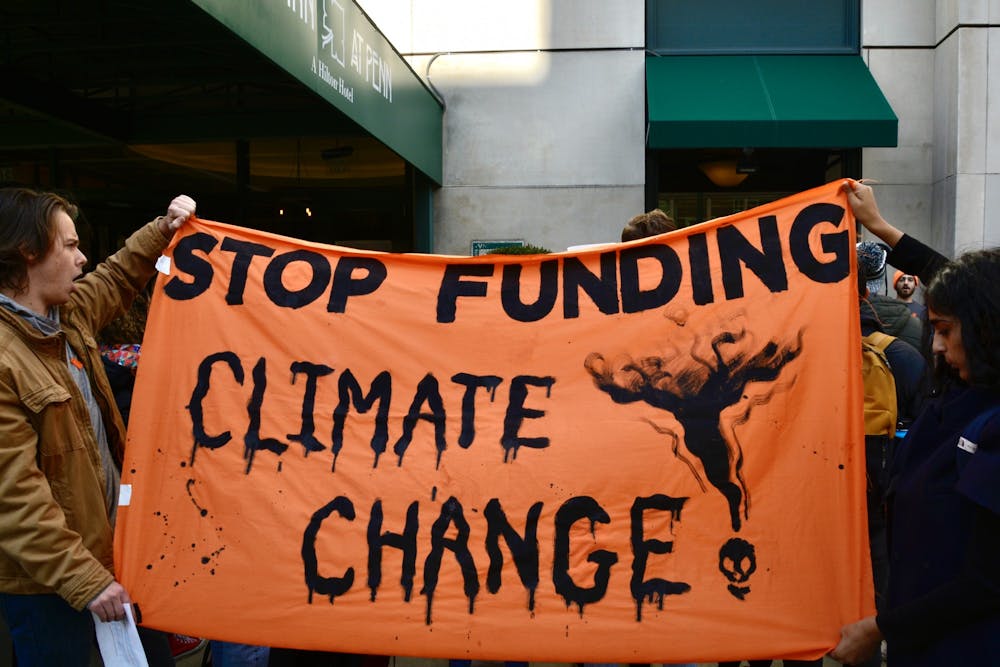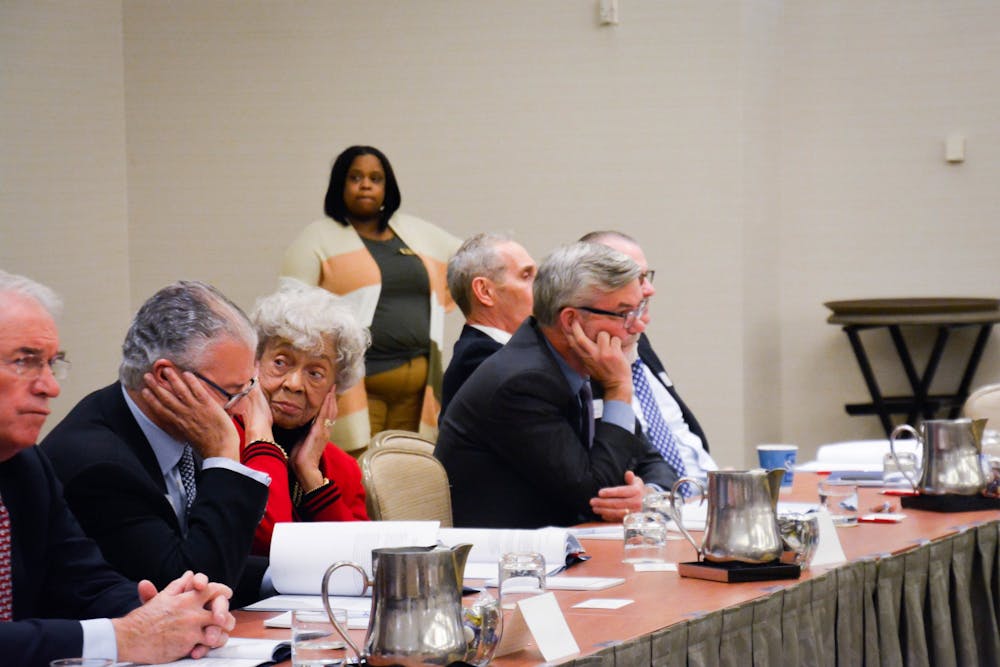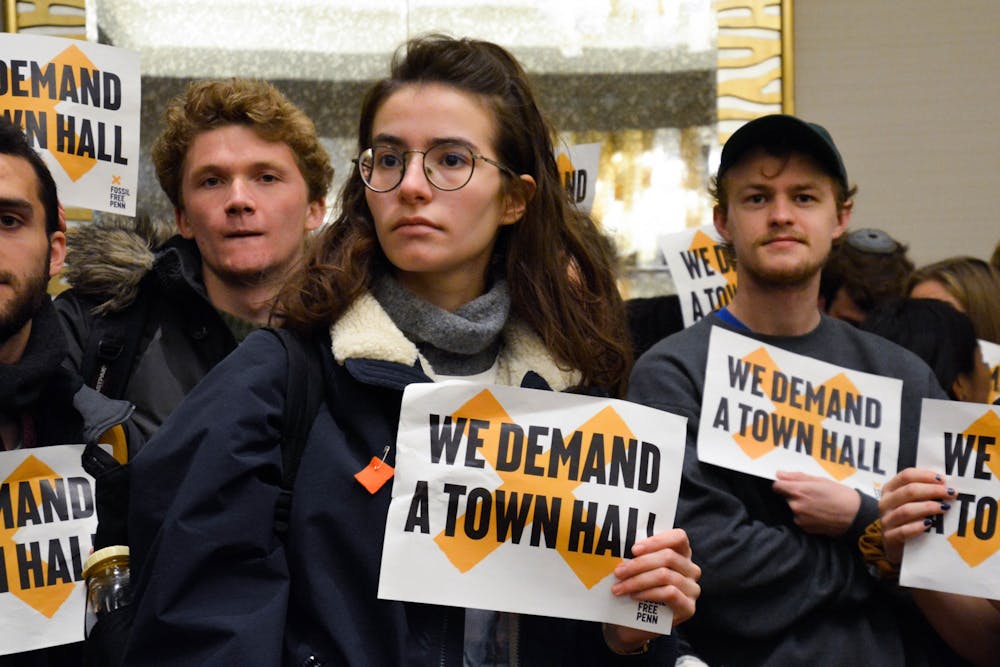
On Wednesday, Penn President Amy Gutmann sent an emailed announcement to the Penn community with updates on the University’s responses to climate change. The University will restrict its investment program and not invest in the coal and tar sand industries, according to Gutmann's email.
The announcement comes over a year after the University Council steering committee rejected Fossil Free Penn’s proposal to divest from coal and tar sands. Since then, the climate strike movement has grown, both globally and on Penn’s campus. Student activists led by FFP have continued to demand divestment through Friday sit-ins in College Hall, hosting speakers and educational events, and in November, a protest which shut down a Penn's Board of Trustees meeting.
“Penn does not hold, and would not expect to hold going forward, any direct investments in companies focused on the production of thermal coal or bituminous (tar) sands, a reflection of the significant carbon intensity – and the corresponding risks – of such businesses,” Gutmann wrote in the email.
Vice President of University Communication Stephen MacCarthy wrote in an emailed statement to The Daily Pennsylvanian that the University does not consider Gutmann’s email a divestment announcement.
“The effect is very much the same, but divestment is a formal procedure requiring approval by the Trustees that involves, among other things, liquidating holdings of particular investments,” MacCarthy wrote. “Since the University did not directly own coal or tar sand investments and does not expect to own them in the future, the University did not go through the formal divestment process.”

FFP has twice attempted to initiate the more formal procedure by submitting divestment proposals to be reviewed by the Board of Trustees. FFP's original proposal in 2015 calling on Penn to divest from all fossil fuels passed the preliminary level of proposal consideration, conducted by the University Council Steering Committee. An ad-hoc advisory committee discussed the proposal for approximately nine months before reaching a final decision against divestment in September 2016. A second 58-page proposal in September 2018 calling on the University to divest from coal and tar sands did not pass the preliminary level.
FFP Campaign Coordinator and College sophomore Katie Collier said the group views the update as a "significant victory" but does not plan to stop protesting. Collier said FFP will continue to hold Friday sit-ins in College Hall and demand a public town hall with administrators to discuss fossil fuel divestment and Penn's plan to reduce carbon emissions.
"We still have not divested fully from fossil fuels and have not divested our indirect investments in coal and tar sands," Collier said. "There is still a lot to be done to keep our university morally accountable in terms of its investments.”
FFP leaders said they feel the announcement was not transparent about the University’s investment history.
“The email does not provide any information about Penn’s prior investments and in no way claims they were never invested in coal or tar sands," FFP Campaign Coordinator and College sophomore Emma Glasser said. "In fact, by highlighting that their current and future portfolio will exclude thermal coal and tar sands, they imply that this is a notable change from past investment strategies."
FFP Coordinator and Engineering junior Ari Bortman said given the lack of clarity in Gutmann’s email, the need for a town hall is greater than ever. He said students need an opportunity to ask questions about the details and concrete implications of the announcement. Bortman added that while he was glad that the announcement represented a common ground between the University and students, more communication is needed.

FFP coordinator and College senior Claudia Silver echoed Bortman, adding that Penn has still not addressed FFP's demands for a town hall.
”It shows us how [the University] views [its] relationship to student power," Silver said. "They’re still not addressing the fact that they’re ignoring us and that we’re trying to have a conversation.”
Penn released its Climate and Sustainability Action Plan 3.0 in October 2019, following an initial five-year plan in 2009 and 2014's Climate Action Plan 2.0. The new plan set goals for the next five years including plans to increase academic study of environmental issues, reduce carbon emissions and waste, and promote sustainable behaviors among members of the Penn community.
Gutmann wrote in the email that the third plan calls for the University to enter into a Power Purchase Agreement in which Penn would obtain green electricity for the campus. Gutmann added Penn is negotiating a long-term PPA that will help develop two new solar energy facilities in Pennsylvania, which will allow Penn to avoid emitting 166,000 tons of carbon annually.
“This is the first time Penn has acknowledged that climate change and where they put their money are intimately linked,” Bortman said. “We hope that now that they’ve acknowledged that, we are getting closer to being on the same page.”
The Daily Pennsylvanian is an independent, student-run newspaper. Please consider making a donation to support the coverage that shapes the University. Your generosity ensures a future of strong journalism at Penn.
Donate




